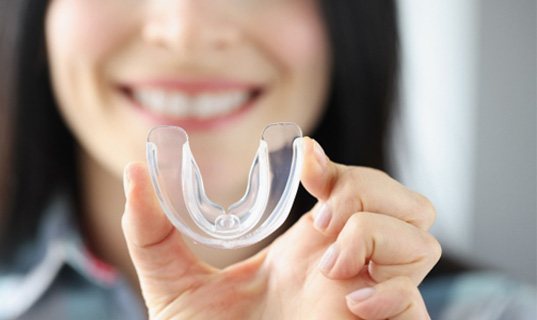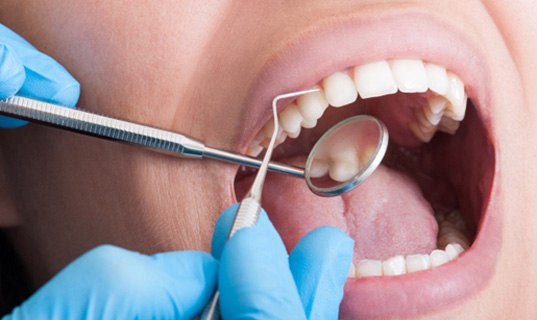Dental Implants – Des Plaines, IL
Comprehensive Tooth Replacements
Why do so many dentists recommend dental implants as a solution for tooth loss? The simple answer is that they come the closest to resembling natural teeth. They are the only tooth replacement option that can simulate the roots as well as the crowns of lost teeth, so your new smile will always be held firmly in place. Have you been thinking of giving your smile an upgrade with dental implants? Give Brite Smiles a call today to schedule a consultation with Dr. Sani to learn more about tooth replacement with dental implants in Des Plaines, IL.
Why Choose Brite Smiles for Dental Implants?
- In-House Dental Implant Placement
- Highly Trained Periodontist
- Modern Dental Technology
What are Dental Implants?

Dental implants are installed via surgical procedures that allow for a permanent prosthetic to last a lifetime. You can think of an implant much like a fake root that is attached to your jawbone, below your gums. Generally, a crown will be mounted on top of your implant to give you that picture-perfect grin you desire. Dental implants can be used to replace missing teeth and restore your entire smile. Many people have dental implants, and both patients and dentists alike choose implants as a positive option when it comes to replacing teeth.
The 4-Step Dental Implant Process

Getting dental implants can be a tad complex. Unlike dentures or bridges, these prosthetic teeth involve a multi-step process that takes months. Still, their benefits are worth all this time and effort. We at Brite Smiles ensure that much by placing the implants in-house. Our dentists use their training and skills to provide amazing results. So, you can expect four steps from our team: consultation, implant surgery, osseointegration, and delivery of the final restoration. Learn more by reading below or calling our office.
Initial Dental Implant Consultation

Your implant journey will start with a consultation. The latter is a brief talk with our dentists, who’ll ask about your treatment goals and oral health background. It helps us better grasp whether an implant treatment suits your needs. If it does, we’ll quickly begin drafting a custom treatment plan.
Of course, we can still help if you don’t initially qualify. We’ll gladly help you get preliminary services – gum disease therapy, tooth extraction, etc. From there, your mouth will have the strength to support dental implants.
If we approve surgery, your consultation will also cover the details of your treatment. Such facts include the treatment timeline, cost, and similar matters.
Dental Implant Surgery

As our office places implants in-house, we won’t refer you to outside specialists. That means your surgery should go quickly and involve less travel. Our dentists will also have instant access to your dental records if you’re a returning patient.
Make sure to expect the following at your implant surgery:
- Anesthesia – Before surgery, our dentists will numb the treatment site(s). This measure keeps you from feeling pain from the implant work. The most you’ll sense is a slight pressure as our staff operate.
- A Minor Incision – We’ll make a small gum incision once the treatment site is numb. After doing so, we’ll create a space for your future implant(s).
- Implant Placement – Our team will place your implant using advanced dental methods and tools.
- Gum Closure – When the placement is done, we’ll close the incision in your mouth. Our dental team will then put a cap over the implant post.
Dental Implant Osseointegration & Abutment

Once the surgery is over, your new implant(s) will slowly fuse with your jaw. This fusion is called “osseointegration” and takes roughly 4-6 months. Your implant post(s) will be permanent and steady when finished.
Following the fusion process, you’ll get another oral surgery. This second one sets an abutment (i.e., a metal connector) over your implant. Said part will secure your final restoration. (The latter will be crafted from earlier dental impressions.)
Delivery of Dental Implant Restoration(s)

At the end of the implant process, you’ll get your final restoration. The nature of this prosthetic will depend on how many teeth you’ve lost. It could be a dental crown, dental bridge, or denture.
Our dental team won’t take long to fit the restoration. In fact, adding it to your implant only requires some dental cement. We’ll then make last-minute changes to ensure good results. Should all go well, you’ll end the visit with a gorgeous and fully restored grin!
Benefits of Dental Implants

Are you curious why roughly 500,000 patients choose dental implants each year? The short answer is that this smile-rebuilding service offers many benefits that you simply wouldn’t get with traditional tooth replacements. Here are a few examples:
Day-to-Day Benefits

Let’s start with the day-to-day benefits of dental implants, which you will enjoy immediately following the recovery period:
- Easier Maintenance: One of the biggest perks of dental implants is that you can maintain them with the same best practices you use for your natural teeth, like brushing, flossing, and getting a dental checkup and cleaning every six months (unless otherwise instructed).
- Increased Confidence: If you are currently wearing or have worn dentures in the past, then you know that they can slip out of place at the most inopportune moments. Since dental implants are inserted directly into your jawbone, they will remain securely in place!
- Ability to Eat Most Foods: Dental implants won’t limit your diet; they will expand it! Thanks to the improved chewing power they provide, you’ll be able to eat a well-balanced, varied diet filled with all of your favorites.
Health Benefits

In addition to improving your overall quality of life, dental implants offer several health benefits. Here are a few examples:
- Jawbone Preservation: Something that makes dental implants completely unique is that they get their support from your jawbone, not your gums. This means that this tooth-replacement option will provide the stimulation needed to help preserve it.
- Protection for Natural Teeth: Unlike some of the other tooth-replacement options available, dental implants are self-supporting. That means that your surrounding healthy teeth don’t need to be altered in the process of rebuilding your smile.
- Better Overall Health: Tooth loss can result in everything from dental drift to trouble chewing and nutritional deficiencies. Fortunately, dental implants can replace one, a few, or an entire arch of missing teeth, benefiting your oral and overall health.
Long-Term Benefits

It’s also worth noting that there are several long-term benefits of dental implants, which makes them worthwhile in the short and long term. A few examples include:
- High Success Rate: Dental implants have an impressive 95% success rate, and it’s even higher among patients who don’t smoke. This is important because you’re investing your valuable time and money into this treatment, so you want it to be a success!
- Youthful Appearance: In short, fully restored dental implants look and feel extremely natural. That’s because they are custom-made for each patient and they are inserted into the jawbone, ensuring that they are lifelike in more than one way.
- Long-Lasting Results: Perhaps the biggest benefit of them all is that dental implants can last for 30+ years with proper care. In other words, they have the potential to last a lifetime with the right maintenance.
Who Dental Implants Can Help

A dental implant can be used to replace teeth in all kinds of scenarios. As such, no matter how many teeth you’re missing, you are likely still a candidate for dental implants as long as you:
- Have a healthy mouth free of gum disease.
- Have enough tissue in your jawbone to support the implant posts.
- Are willing to undergo any preliminary procedures that might be needed to meet the first two criteria.
Below are some of the implant procedures that might be suggested depending on the extent of your tooth loss.
Missing Single Tooth

Replacing just one tooth with dental implants is relatively easy. All we need is a single implant post and a crown. Once the post has fused with the jaw, we can attach the crown to it in much the same way we might restore a natural tooth. This will leave you with a dazzling, complete smile.
Missing Multiple Teeth

We can use two dental implants and a bridge to replace multiple teeth in a row. A bridge that uses implants for support does not require us to make any changes to your natural enamel, so your remaining teeth will remain undisturbed after the dental bridge has been placed in your mouth.
Missing All of Your Teeth

How many implants does it take to replace an entire row of teeth? Believe it or not, the answer is typically just four to six implant posts. That’s enough to hold a denture in place so that you can eat, speak, and smile comfortably. Implant dentures can be removable or fixed depending on what you need.
Learn More About All-On-4 Dental Implants Learn More About Implant Dentures
Dental Implants Post-Op Instructions

Once your dental implants have been surgically placed, the recovery period begins. This is reasonably easy to manage, and we’ll make sure you know what to expect, what symptoms are normal, and how you can help your body heal. If you find that you have intense or abnormal pain or any side effects that aren’t mentioned here, please call us for further guidance.
What to Do Directly After Dental Implant Surgery

The most important thing after receiving dental implants is to leave the blood clot alone so the healing process can go smoothly and with minimal discomfort. To help ensure a speedy recovery, take care to stick to the following rules:
- Refrain from spitting. Swallow saliva or collect it with tissues.
- Do not drink through a straw.
- Refrain from smoking for at least the first day.
- Avoid probing at the surgical sites with your fingers or tongue.
Common Side Effects When Recovering from Dental Implant Placement

You can expect to experience some side effects after receiving dental implants, especially during the first few days. A few common side effects include:
- Intermittent bleeding that can be reduced with gauze or light pressure. This may go on for several days.
- Swelling during the first 72 hours. This may last for more than a week, but a cold or warm compress may help.
- General discomfort that can be managed with prescribed or over-the-counter pain medication.
Your Diet After Dental Implant Surgery

In the days immediately following dental implant surgery, the surgical sites will be sensitive and can be easily irritated by hot, spicy, or grainy foods. To avoid unnecessary discomfort during this period, we recommend that you adhere to a diet of soft, mild, and non-abrasive foods such as:
- Ice cream
- Mashed potatoes
- Pasta
- Pudding
- Scrambled eggs
- Soup that is not too hot
- Yogurt
While you can return to your normal diet as soon as you feel up to it, we suggest limiting your consumption of crunchy or tough foods and avoiding chewing directly on the implant sites.
Post-Op Health & Oral Hygiene

While it’s okay to brush your teeth normally the day after receiving dental implants, it’s important to be very careful around the surgical sites. You should also rinse your mouth with salt water two or three times daily, especially after meals, and use your prescription mouth rinse as instructed if you have it. It’s also important to avoid using mouthwashes that contain a lot of alcohol such as Scope or Listerine.
What to Do After Your New Teeth Are Attached
By the time your artificial teeth are attached, the hard part is already over. You may experience some minor sensitivity in your gum tissue when your crown, bridge or denture is attached, but this can be easily managed with pain medication. You shouldn’t have to worry about swelling, bleeding, or an extensive recovery, and you’ll be ready to show off your new smile that same day!
Maintaining & Caring for Your Dental Implants

Dental implants are great at “filling in” for missing teeth. It’s to the point that people often call them the “ultimate tooth replacements.” Even so, they won’t work if you don’t care for them well. These metal posts can fail early when they don't get proper maintenance. Therefore, we at Brite Smiles want to offer some help. Listed below are some vital tips on dental implant care in Des Plaines. Please review them to ensure your new teeth last, or call our office for more details.
Make Oral Hygiene a Priority

Dental implants – unlike natural teeth – can’t get cavities. They're artificial and don't decay from plaque and such. Still, it’s best to clean them daily. Anything less will put your new teeth at risk.
You see, dental implants only work when your mouth is healthy. Nearby oral problems tend to make them unstable. For instance, a case of gum disease may loosen your implant by causing gum recession. Similarly, your infection could erode the bone tissue that supports the implant post.
All that said, you can avoid such dilemmas with good oral hygiene. Twice-daily brushing and once-daily flossing prevent and reduce threats to your implants. That way, the posts are more likely to stay safe and functional.
Eat a Healthy Diet

You can enjoy many foods (tough or not) with dental implants. However, you ought to stick to a healthy diet regardless. Your implants could fail early otherwise.
The issue is that unhealthy items often have bad effects on implants. For example, sticky and sugary junk food can wedge between the posts. This debris could then decay adjacent teeth and infect tooth or gum tissue. From there, you could suffer implant failure.
Thankfully, your implants can thrive when you follow a healthy diet. Foods rich in calcium, phosphorus, and vitamin C are especially good for them. When you ingest these nutrients, you’ll reduce your risk of gum disease and strengthen your jaw.
Break Bad Habits

Dental implants are strong and sturdy; they can withstand the average bite. That said, bad oral habits can still break them at times. You’ll want to avoid such things to preserve your restored smile.
Several examples of these habits exist. An especially notable one is smoking, as tobacco delays recovery from implant surgery and can make the posts fail. Another bad habit is chewing on hard objects. If you bite too intensely on a fingernail or pencil, you could chip your implants.
Protect Your Dental Implants

While dental implants use durable materials, they can break apart under extreme force. You’ll want to take steps to protect them.
In particular, keep your implants safe with a mouthguard. Wearing one for sports will shield your replacement teeth from injuries. On the other hand, a custom nightguard will keep you from grinding your teeth in your sleep.
Schedule Regular Dental Checkups

No matter how diligent you are, you can’t care for dental implants alone. There’ll always be an issue you miss or overlook if you act on your own. For these reasons, you should see your dentist often. Regular dental checkups with them will keep your implants working.
If you didn’t know, dental checkups are the best form of preventive oral care. These visits stop dangers to your implants before they can take off. After all, your dentist will assess your smile closely and treat minor issues before things get worse. They won’t let major threats to your implants take root.
Dental Implant Failure & Salvage

One of the unique benefits of dental implants is the fact that they have an astonishing success rate of over 95%! Dental implant failure is rare, but it can still happen in some circumstances. Fortunately, when caught early on, we may be able to save your failing replacement tooth. If you have any concerns regarding your implant, or if it is causing you discomfort, don’t hesitate to contact us. We will do everything we can to restore the health of your smile!
Learn More About Dental Implant Failure & Salvage
Understanding the Cost of Dental Implants

Of course, dental implants do carry a higher cost than other tooth replacement solutions, although exactly how much you end up paying for them depends on a variety of factors (which will be discussed at your initial consultation). It’s worth remembering that dental implants last much longer than other restorations, so you don’t have to pay to replace them. They also offer many health benefits, which could help you avoid potentially costly problems in the future. Here are some things for you to take into account.
Preliminary Treatments & Dental Implant Surgery

Sometimes, patients need to have gum disease treatment, tooth extractions, bone grafting, or another treatment before they are able to get dental implants, so you should consider the costs of these treatments as well if they apply to you. The good news is that many preliminary procedures are partially covered by dental insurance. At Brite Smiles, we are pleased to work with both in-network and out-of-network patients and will do our best to help you save each time you visit.
The Parts of Your Dental Implant

There are a variety of factors that can play a role in the cost of your treatment. Here are the main ones that we consider:
- Number of Dental Implants: The number of teeth that you are missing and where they are located will determine the number of dental implants that you will need. The more you require, the higher the cost will be.
- Type of Restoration: Dental crowns, bridges, and dentures are all at different price points. Most of the time, smaller restorations are less costly.
- Materials Used: Dental implants are usually made from surgical titanium. However, they can also be crafted zirconia in some cases.
- Dental Implant Brand: Just like other products, dental implants come from different manufacturers. This influences their cost.
How Dental Implants Can Save You Money

It may be tempting to try to save money on your treatment by considering other tooth replacement options, like dentures or dental bridges. Both of these are effective at addressing tooth loss, but they don’t come with the same advantages as dental implants do. Ultimately, dental implants can help you save money in the long run. Implants don’t need to be replaced or repaired every few years, adhesives and soaking solutions aren’t needed, and future oral health issues can be avoided. These are just some of the ways that dental implants can save your wallet.
Does My Dental Insurance Cover Dental Implants?

A lot of the time, dental insurance doesn’t cover the cost of the dental implant itself. However, there are some exceptions to this rule. Parts of the final restoration and preliminary treatments could receive partial coverage. However, every plan looks a little bit different, so it is always best to reach out to your provider ahead of time so that you don’t end up with any unnecessary surprises. We would also be happy to help you with this process.
Making Dental Implants Affordable

If you don’t have dental insurance, this doesn’t completely eliminate your options. With our in-house dental plan, you can save on treatments completed at our practice. We are also happy to accept payments through CareCredit – a third-party financing company that can split the cost of your treatment into manageable monthly installments with little to no interest. To learn more about your financial options, don’t hesitate to reach out to one of our friendly team members!
Dental Implant FAQs

If you’re looking for a more comprehensive solution for replacing missing pearly whites, then dental implants may be the ideal option for you. Not only do they offer superior stability compared to other traditional restorations, but they’re also designed to last several decades to a lifetime! However, you may want to know as much as possible about the treatment before completely committing to it. Our team at Brite Smiles is happy to share and answer some of the most common questions we get about dental implants in Des Plaines. Keep reading to learn more or reach out to our office today to schedule your initial consultation.
Does Getting Dental Implants Hurt?
Firstly, our team will ensure that your mouth is completely numbed with a local anesthetic before beginning your procedure. Furthermore, your jawbone doesn’t have many nerve endings, so you typically won’t experience much discomfort during your appointment. While the surgery itself doesn’t hurt, your mouth might feel sensitive or sore for several days following your treatment. This can easily be managed by taking prescribed or over-the-counter pain relievers as instructed. You can also place an ice pack on the outside of your mouth to help reduce discomfort and swelling. If your condition worsens or doesn’t improve after two or three days, notify us right away for help.
How Long Do Dental Implants Last?
The longevity of dental implants usually depends on the patient’s oral/overall health and lifestyle habits. That said, with proper care, these titanium posts can last as far as several decades to the rest of your life. To make the most of your new pearly whites, you’ll need to implement strict oral hygiene, including brushing, flossing, and rinsing with mouthwash every day. Visiting our team for dental checkups and cleanings every six months can also help you maintain a healthier smile in the long run. Refrain from chewing on food that’s too hard or sticky to avoid damaging your teeth over time.
Can I Get Dental Implants If I’m Diabetic?
As long as you keep your diabetes under control, you can expect a higher chance of dental implant success that’s comparable to patients without diabetes. If your condition is left unchecked and you have chronically high blood sugar, it can end up interfering with or delaying your healing process, which is essential for allowing your implant to integrate with your jawbone. For this reason, you’ll need to consult your endocrinologist or primary care doctor if you’re interested in dental implants. They’ll help get your blood sugar levels back to normal before starting your restorative treatment.
Will I Have to Take Off Work for Dental Implant Surgery?
Although you’ll need plenty of time after your treatment to rest and recover, most people only require taking off a day or two to receive their dental implants. That said, if you have a physically demanding job, you might want to take off three or four days instead. Performing heavy or strenuous exercise can cause blood to divert from the surgical site, interfering with your healing process. Since every patient is different, you’ll need to speak with your dentist to get a more specific recommendation for your unique case.


